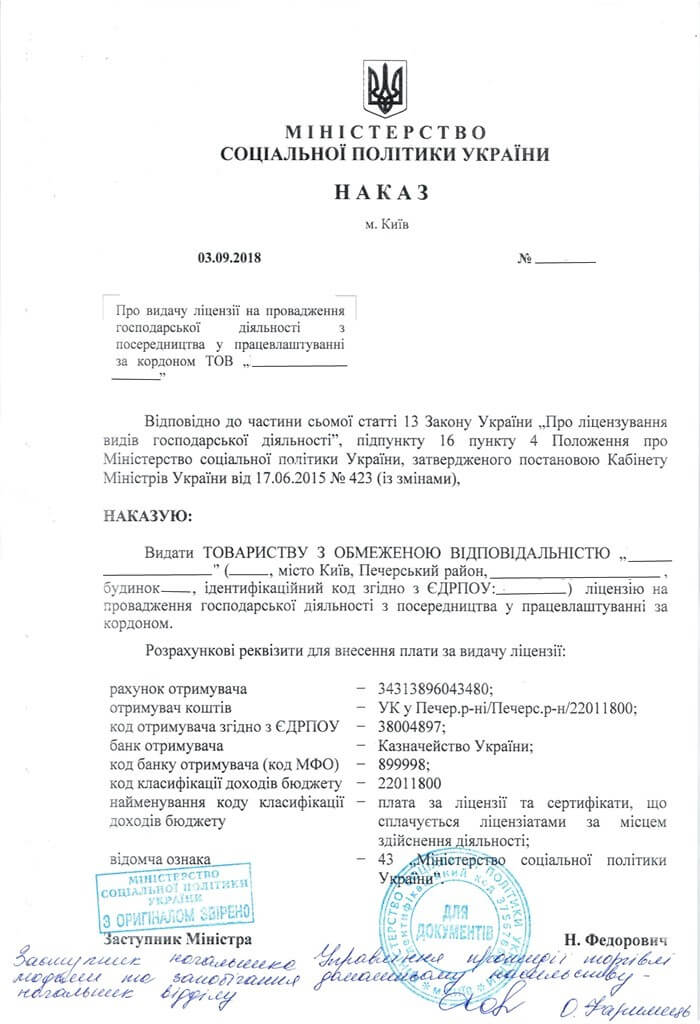Peculiarities of foreign partner’s documents certification

According to the licencing regulations governing the activities of the overseas employment agencies, in order to obtain the relevant licence it is necessary to submit, among others, documents on the foreign partner to the licencing authority. We will elaborate on these documents in this publication.
Sub-clause 2 of clause 4 of the abovementioned licensing regulations: a copy of the document on the foreign business entity registration in its country. Such a document, as a rule, is an extract from a trade, court or other register in which business entities of the respective country are registered. In many countries, a simple printout from the Internet is practiced. However, for the purposes of obtaining a license, such a document is not suitable. It must be certified by the authority that issued it. In some countries, for example, Poland, a notary may issue an extract from the court register and certify it with its seal. It is desirable that the document on the foreign partner registration contains complete information about the foreign partner: location, director’s name, types of economic activity. After the start of our cooperation, we provide our Clients with detailed instructions, including the scans of registration documents of the countries we have already worked with. Thus, our Clients simply need to find the appropriate country from the list. If his country is not listed, they can see many examples. And this greatly simplifies obtaining the registration document.
Sub-clause 3 of clause 4 of the licensing regulations: a copy of the permit (license) to employ foreign nationals. This is a permit to employ foreign nationals issued to the ultimate employer (a foreign partner) by the government of its country. A copy of this document shall be submitted only in cases when such a permit is required by the legislation of the country where the employer is registered. In many countries, no permits are required to hire foreigner nationals. So, you should ask your counterpart about this requirement before starting the cooperation.
Sub-clause 4 of clause 4 of the licensing regulations: a document (a copy or an extract from it) of a foreign business entity on types of its economic activity. You don’t need to submit this document, if the registration document contains information on the types of economic activity.
Sub-clause 5 of clause 4 of the licensing regulations: a copy of the permit (license) to provide intermediary services related to employment of foreign nationals issued to the intermediary, if such document is stipulated by the law of the country of employment. A copy of this document shall be submitted only if the Ukrainian intermediary (licensee) intends to work with a foreign intermediary. If the employment of Ukrainian citizens is planned directly to the final employer, this document is not required.
The procedure for certifying all the abovementioned documents depends on the country where the foreign partner and the ultimate employer are registered (if they are different persons). Documents of most countries are certified by apostille. What is an apostille and what does it look like? Documents of the 1961 Hague Convention countries shall be certified by an apostille. Since the Convention has been signed, more and more countries are joining the Convention almost every year.
In addition, Ukraine has entered into legal assistance agreements with a number of countries abrogating the requirement for the documents legalization. In particular, these are post-Soviet countries, as well as Poland, Czech Republic and Hungary. The documents of these countries do not even require an apostille. It’s enough to certify these documents by a seal of the issuing authority or by a notary.
As to the countries with which Ukraine has no agreements on mutual recognition of documents and which have not acceded to the Hague Convention, the circulation of documents is regulated by the 1963 Vienna Convention on Consular Relations. This Convention establishes the procedure for legalization of documents. Legalization is a rather complicated and multistage procedure of documents authenticity confirmation.
Thus, when requesting documents specified in sub-clauses 2-5 of the licensing regulations from the foreign partner, one should take into account the peculiarities of relations between Ukraine and the foreign partner’s country of registration and ask them not only to provide these documents, but also to properly certify them in their country.
The licensing regulations also provide for the submission of documents, the list of which is specified below.
Sub-clause 6 of clause 4 of the licencing regulations: information certified by the foreign employer on the list of the watercrafts it owns and/or crews it manages. Applicable only in the case of employment in the watercraft. Such information may be submitted in the form of a certificate drawn up as a bilingual dual column document (the Ukrainian version is a must). If this information is submitted as a bilingual document, you won’t need to translate it into Ukrainian. This document is not subject to notarization, apostilization, legalization as well.
Sub-clause 7 of clause 4 of the licensing regulations: a copy of the collective agreement, agreements with professional associations (trade unions) or a certificate of absence of such agreements. In the overwhelming majority of cases, the ultimate employer has neither a collective agreement, nor agreements with trade unions. Therefore, a certificate on the absence of such agreements shall be submitted. Like the document specified in sub-clause 6, it can be prepared in two languages and certified only by the foreign business entity.
Sub-clause 8 of clause 4 of the licensing regulations: a copy of the foreign economic agreement with the foreign partner and a draft employment agreement certified by the foreign employer. When drafting these documents, it should be taken into account that the foreign economic agreement (the agreement between the license applicant and the foreign partner) must meet the criteria of the foreign economic agreement. And the draft employment agreement must comply, first of all, with Ukrainian legislation. In particular, the Law of Ukraine “On Foreign Labor Migration”. The draft employment agreement shall specify working conditions, procedure and amount of payment, provision of social assistance and insurance, procedure of repatriation, etc. That is why the draft employment agreements provided by foreign employers do not, in most cases, meet the licensing requirements. Both the foreign economic agreement and the draft employment agreement may be prepared in two languages (in two columns). They are not subject to translation, notarization, apostillization and legalization. They shall have only the signatures of the respective parties (the draft employment agreement shall be signed only by the employer).
Hopefully, this article has provided insight into the documents that need to be collected in order to obtain an employment agency license. But it should be remembered that you need not only to gather a complete set of necessary documents, but also to properly draw them up.
If you liked this article, please leave your review by visiting this link.
Our clients














